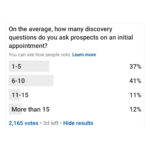 Are you asking enough questions? A couple of weeks ago, I ran a poll on a very popular LinkedIn group. The poll question was simple: “On the average, how many discovery questions do you ask a new customer on an initial appointment?” If you’ve read any of my work at all, you know that I believe that the root of good things in selling is asking a lot of good questions; in fact, questioning is the longest unit in my training programs. Well, I’m starting to feel like I’m on an island with a pretty small population.
Are you asking enough questions? A couple of weeks ago, I ran a poll on a very popular LinkedIn group. The poll question was simple: “On the average, how many discovery questions do you ask a new customer on an initial appointment?” If you’ve read any of my work at all, you know that I believe that the root of good things in selling is asking a lot of good questions; in fact, questioning is the longest unit in my training programs. Well, I’m starting to feel like I’m on an island with a pretty small population.
The results were shocking to me. Spoiler alert: 37% of respondents said that they asked 1-5 questions on a first appointment; 41% asked 6-10. In my opinion, the sweet spot for a quality discovery is 11-15 questions; only 11% of respondents were in that bracket. 12% were discovery overachievers who asked more than 15 questions. After I pushed my lower jaw back up (it had dropped to hit the desk), I realized that within weakness in the market, there is opportunity. And it’s YOUR opportunity. If 77% of salespeople ask 10 or less questions, they’re not getting to know customers very well. That’s your competition. Want to beat them? Ask more questions. But what should you be asking about? I’ll tell you.
- Your contact’s professional history. “How did you come to be in this position?” is a great question. People love to tell their stories, and this question gives you a great window into their viewpoints as well as being a good rapport-building question. For instance, a plant manager who started out turning wrenches might respond to different value propositions than one who came to the plant fresh from getting an MBA.
- The company’s past, present, and future. Yes, many companies put this info on their website. Have you ever seen a website that was out of date? Me too. And if you are working from obsolete or incorrect information, you might end up presenting the wrong solutions. Ask – or, better, refer to what you read and ask for your contact’s viewpoint on it. That way you show that you’ve done your homework AND that you’re curious.
- Company priorities. Just because your “stuff” is the most important thing in the world to you, it doesn’t mean that it’s the most important thing to your customer. Where does your stuff fall on the list of priorities for your company or your contact? This will have a lot to do with the importance and urgency of your proposal.
- Needs regarding your stuff. Notice that we are just now starting to ask about what you sell, and what their needs are regarding it. That’s because your end of the world is a small part of the big picture in their world – and you need to know the lay of the land before you start probing what’s wrong in your part of the world. By the way, don’t neglect asking about what’s right in your part of the world – if you don’t get the sale, this is going to be a big part of the reason why.
- How they define success. Ultimately, all sales questions boil down to understanding how your customer defines a successful purchase, and how you can help them achieve it. Still, at this point, you should probably ask a direct question about how they will define success.
- Process questions. You should also understand the customer’s buying process, and how it will impact this purchase.
- More questions. There’s more to ask – but you get the idea. Are you asking enough questions? Here’s what you should know: If you ask six questions, you are now better than 37% of your competitors. If you ask 11 questions, you are now better than 78% of your competitors. And so on. And you should, of course, drill down on many of those questions.
Is my survey scientific? Nope. It was a LinkedIn survey. This probably skews the numbers, but does so in a positive way. Salespeople on LinkedIn groups who respond to surveys like this one are probably higher on the scale of the profession, because they’re more engaged. So, if anything, that means that the real numbers are worse than what’s reported on my survey. In the comments, some “salespeople” expressed disdain for the very idea that comprehensive questioning is important; one even said, “If a salesperson is a dynamic opener, he doesn’t need to ask many questions and can close the sale in one call.” I suppose there are areas of selling where that might be true, but it’s not in a highly professional sales universe.
The bottom line – when you are considering your questioning and discovery, here are some things to remember:
- More is typically better.
- Asking questions shows you care.
- The worst question is the one you don’t ask.
- From time to time, you should re-ask questions of current customers; things change.
- Great salespeople are always working to improve their questioning skills.
That’s all for now. If you’ll excuse me, I have to get the look of amazement off my face.


